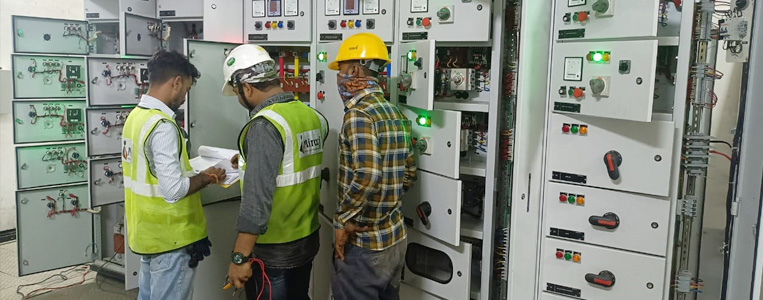Beginner’s Guide to HV Testing and Commissioning Services

Introduction
High-voltage (HV) electrical systems are the backbone of critical infrastructure in sectors like energy, manufacturing, mining, and construction. These powerful systems require more than just careful installation—they demand comprehensive testing and commissioning to ensure they function safely, efficiently, and in full compliance with regulatory standards.
For those unfamiliar with the process, HV Testing and Commissioning Services can seem highly technical. This beginner-friendly guide aims to demystify the process and explain why it’s an essential step in any electrical project. If you’re managing or planning an HV installation in Australia, this article is your starting point to understanding how providers like MPT Services can help protect your investment and keep your systems safe.
What Is HV Testing?
HV Testing refers to a series of procedures used to verify the safety and integrity of high-voltage electrical components before they are energized and put into operation. These components include:
- Transformers
- Switchgear
- High-voltage cables
- Protection relays
- Circuit breakers
The main goal is to detect any manufacturing defects, damage during transport or installation, and to confirm proper insulation, continuity, and safety measures are in place.
Common HV Tests Include:
- Insulation Resistance Testing: Checks for insulation degradation.
- High-Potential (Hi-Pot) Testing: Applies a voltage above operating level to detect weaknesses.
- Contact Resistance Testing: Measures connection strength between conductors.
- Partial Discharge Testing: Identifies microscopic electrical discharges within insulation.
What Is Commissioning?
Commissioning is the process of validating that an entire electrical system functions as designed when operating in the real world. This includes verifying protection schemes, control logic, and inter-device communication.
Commissioning ensures:
- All components are properly installed
- Protection systems are correctly configured
- The system meets local safety and performance standards
- Integration with other systems (like SCADA or BMS) functions seamlessly
While testing focuses on individual components, commissioning ensures the whole system operates cohesively.
Why Are These Services Important?
High-voltage systems are inherently dangerous if not properly tested and verified. Electrical faults, arc flashes, equipment failure, or total power loss can result from issues that go undetected during installation.
Benefits of Professional HV Testing and Commissioning:
- Improved Safety: Prevents electrical hazards and injuries.
- System Reliability: Ensures smooth operation from day one.
- Compliance: Meets Australian standards like AS/NZS 3000 and AS/NZS 2067.
- Reduced Downtime: Identifies potential issues before they cause unplanned outages.
- Cost Savings: Early detection of faults avoids expensive repairs or replacements.
HV Testing and Commissioning Services in Australia
Australia has strict regulations when it comes to high-voltage installations. Electrical systems must adhere to various standards, including:
- AS/NZS 3000 (Wiring Rules)
- AS 2067 (Substations)
- AS 62271 (HV Switchgear)
Choosing a testing and commissioning provider familiar with these standards is critical. At MPT Services, our engineers are trained in both national regulations and industry-specific requirements to ensure full compliance and safety.
When Should You Use HV Testing and Commissioning?
These services are essential at multiple stages of your project:
- New Installations – Before energization of new substations, switchboards, or transformers.
- Upgrades – When expanding or modernizing existing systems.
- Routine Maintenance – For periodic safety checks and performance validation.
- Fault Investigations – To diagnose and resolve system failures or outages.
The MPT Services Approach
At MPT Services, we offer end-to-end HV Testing and Commissioning Services across Australia. Our team of qualified engineers and technicians bring years of experience in industrial, commercial, and utility sectors.
Our Services Include:
- Equipment verification (transformers, cables, switchgear)
- Protection relay configuration and testing
- Control system validation and functional testing
- Thermal imaging and fault detection
- Detailed documentation and compliance reporting
Whether your project is in a metro city or a remote location, our mobile testing units ensure fast, accurate, and reliable service delivery.
Common Mistakes to Avoid
Even experienced project managers can fall into these traps if not working with a qualified HV testing and commissioning partner:
- Skipping Testing Due to Deadlines: Rushing to energize without proper checks can lead to system failure.
- Improper Relay Settings: Incorrect protection settings can lead to false tripping or dangerous faults.
- Poor Documentation: Incomplete reports make future audits or maintenance more difficult.
- Lack of Coordination: Without a dedicated commissioning team, miscommunication between contractors can lead to system integration issues.
MPT Services avoids these pitfalls through structured processes, detailed planning, and effective stakeholder coordination.
Final Thoughts
HV Testing and Commissioning Services are essential for delivering safe, compliant, and high-performing electrical systems. While the processes may seem technical, the core goal is simple: to ensure your system works as intended, right from the start.
By working with a trusted provider like MPT Services, you can move forward with confidence—knowing your high-voltage infrastructure is verified, protected, and future-ready.
Read This Also





